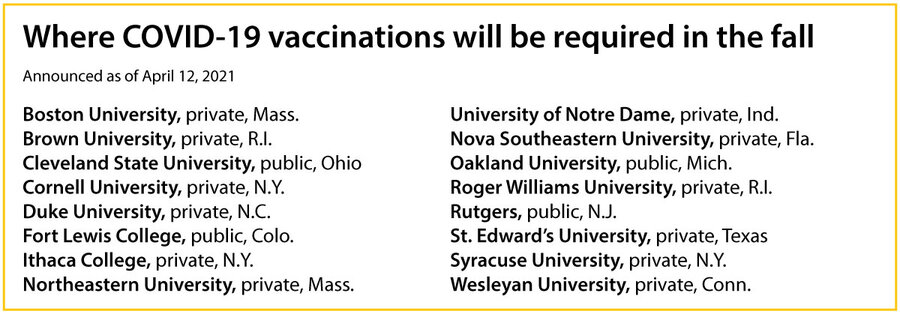Vaccine mandates: Colleges juggle ethics and enrollment dilemmas
Loading...
| New York
Hoping to attract students back into the classroom for a more normal fall semester, colleges and universities are starting to require COVID-19 vaccinations for in-person attendance.
At least 16 U.S. colleges and universities – a mix of public and private, large and small – have announced the requirement for the fall, with more announcements expected. Others are incentivizing compliance by offering campus employees a cash bonus to do so or offering vaccinated students and staff the option of going maskless this spring.
But as college leaders weigh the ethics of mandating the measure to further safe reopening, political and legal challenges may complicate these plans.
Why We Wrote This
A sense of safety is key for getting students back on campus. Colleges are juggling ethics and politics as they decide how far to go in encouraging COVID-19 vaccines.
“I suspect that there will be these divisions along partisan lines – in the way that we have seen with mask mandates, with social distancing, when states decided to reopen – that will influence decisions by colleges and universities,” says Lynn Pasquerella, president of the Association of American Colleges and Universities.
All states have school vaccination requirements, and some include higher education. Though exemptions vary, all states must exempt people medically unfit to receive vaccinations, says James Hodge, health law professor at the Sandra Day O’Connor College of Law at Arizona State University.
“Universities use vaccine mandates all the time,” says Professor Hodge. “The expectation is you fulfill those, or else you don’t get to show up and study, or matriculate.”
Some experts say the lack of full U.S. Food and Drug Administration approval of COVID-19 vaccines could invite legal challenges. All three vaccines available in the U.S., so far, have emergency use authorization (EUA), not full approval.
Nonetheless, says Sten Vermund, dean of Yale School of Public Health, “This particular set of vaccines for [the novel coronavirus is] remarkably safe and remarkably effective.” But, adds the epidemiologist, “How American universities are going to set policy is going to be a balance between their view of social obligation versus individual liberty.”
(On April 13, after Dr. Vermund's remarks to the Monitor, the federal government recommended pausing the use of the Johnson & Johnson vaccine “out of an abundance of caution” as it undergoes more review.)
Equal access implications
Colleges will face complications in considering the mandates – like employment law and equitable access, says Dr. Pasquerella.
For example, she notes, “If the most vulnerable students are having to worry about whether the person sitting next to them is a COVID carrier, they’re not going to have access to equal opportunity and learning.”
Cornell University student Bianca Garcia supports her school’s plan to require the vaccines for students, and trusts the private New York institution will respect medical and religious exemptions.
“I’m looking forward to just being able to expand my social circles and explore this place disease-free, guilt-free,” says the sophomore.
Some students oppose the measure.
“I am not anti-vax. I am extremely anti-mandate,” says Sara Razi, a junior at Rutgers, a public university in New Jersey among the first to announce a mandate for students in late March. Like the pandemic, the vaccine has “been politicized,” she adds.
In Florida, the private nonprofit Nova Southeastern University with over 20,000 students is requiring COVID-19 vaccinations for students and employees returning in person this fall, though a remote option will remain available.
“If we’re talking about protection, we want everyone to have as much protection as possible,” says Harry Moon, executive vice president and chief operating officer.
Political pushback?
The day after Nova Southeastern’s April 1 announcement, however, Republican Florida Gov. Ron DeSantis signed an executive order banning government entities from issuing and businesses from requiring “vaccine passports.”
“We respect the governor very much,” says Dr. Moon, whose school is reviewing the order. “We have a fair amount of time to develop the policies and procedures to accomplish the goals that we’re seeking.”
Other early signs of political reckoning are emerging.
Following a COVID-19 vaccine mandate for students and employees announced by a private Austin university March 29, Republican Gov. Greg Abbott of Texas signed an April 5 executive order barring government agencies – along with public and private entities receiving public funds – from creating COVID-19 requirements for services. St. Edward’s University has since stated that its policy squares with state law, because it allows “exemption pathways.”
A Democratic state lawmaker in Rhode Island introduced a bill in February that would make vaccination status a protected class shielded from discrimination. At least two private universities in the state have announced COVID-19 vaccine mandates this spring.
As access to vaccines expands – with all adults expected to be eligible by April 19 – several schools have turned their campuses into vaccination sites.
Some are incentivizing the shots, like Johnson County Community College in Kansas, which is offering $250 to employees who get vaccinated, the Shawnee Mission Post reports.
At public Dickinson State University in North Dakota, with under 1,500 students, fully vaccinated students and employees can opt out of a mask mandate this spring, which is set to expire in the fall. Individuals can receive buttons or wristbands that signal they’re allowed to go maskless.
“We really want to hope that we can incentivize the vaccine, while still allowing people to make individual decisions,” says Dickinson president Steve Easton. “We prefer that we do everything we can to fight this disease without mandated medical treatments.”







